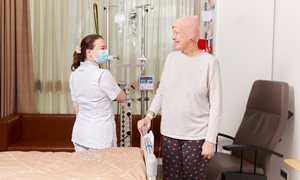
Radboudumc and UMCG are participating in a European study on hospital-produced CAR-T cell therapy for patients with refractory acute lymphoblastic leukemia. The Dutch Cancer Society (KWF) together with European funders is providing over nine million euros to conduct the study in the Netherlands. The project is led by Spanish researchers. If the therapy proves successful, it may be reimbursed through health insurance in the Netherlands.
Chimeric Antigen Receptor (CAR)-T cell therapy is a form of immunotherapy in which a patient's own immune cells are genetically modified by researchers to better recognize cancer. These modified T cells are then administered to the patient as a medication, enabling the patient's immune system to eliminate cancer cells.
Also for adults
This treatment is already available for patients under 26 years old with B-cell acute lymphoblastic leukemia through commercial companies. Researchers from UMCG lead the study in the Netherlands, collaborating with Radboudumc and various European treatment centers to investigate whether locally produced CAR-T cell therapy in the hospital (also known as Point-of-Care) is a viable alternative for adult patients. In the study, patients from across the Netherlands for whom chemotherapy is ineffective or whose cancer relapses, will be treated in Groningen and Nijmegen. The study is expected to start this summer.
European approval
In Spain, therapy with hospital-produced CAR-T cells for acute lymphoblastic leukemia patients is already possible under certain conditions and has shown success. However, before European patients can receive this treatment, it must be approved by the European Medicines Agency (EMA). Large-scale studies in multiple countries are required for this approval. Therefore, researchers are conducting this study in Spain, the Netherlands, Belgium, Germany, and France. If the study shows the therapy's effectiveness in all five countries, there is a high likelihood of European approval. This means that health insurance can cover the treatment for patients.
In-house production
This study marks a significant step in the development of CAR-T cell therapy. Since 2020, UMCG has been producing its own CAR-T cells in collaboration with the hospital pharmacy for patients with B-cell lymphoma, a specific form of lymph node cancer. Radboudumc is also establishing this production. In-house production of CAR-T cells has significant advantages, allowing the treatment to be performed within seven days compared to the four to six weeks required for commercial production. This time savings is crucial for seriously ill patients. Additionally, self-production results in substantial cost savings: treatment with self-made CAR-T cells is three times cheaper than treatment with commercial CAR-T cells.
At Radboudumc, the project is led by hematologist Suzanne van Dorp, along with Professor of Translational Immunohematology Harry Dolstra from the Laboratory Medicine department and associate professor Janneke Grutters from the IQ Health department. Van Dorp: 'Academic production is essential for the availability, sustainability, and innovation of CAR-T cell therapy in cancer treatment.'
-
Want to know more about these subjects? Click on the buttons below for more news.
Related news items

Putting the immune system on its feet
7 July 2025Immune cells gently kick their surroundings using hundreds of tiny feet. If they bump into something hard, it can have major consequences.
go to page


_1.png?width=500&height=300&ext=.png&type=BlockColumn1Zoom1)
